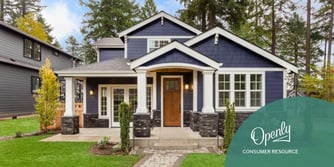If you own a home, the thought of insuring it probably isn't the most exciting thing on your list. But it is arguably one of the most important. Like any type of insurance, having enough coverage can be crucial to protecting yourself and your family's future. When the worst happens, homeowners don’t want to be left without the protection they need to get their home back to what it was before their loss.
At a glance:
-
Dwelling coverage is the most important part of an homeowners insurance policy and can be covered by: actual cash value, replacement cost, and guaranteed replacement cost.
-
Losses to other structures on your property are typically covered for 10% of the value of the home.
-
For coverage of personal belongings, it is best to take a home inventory.
What does homeowners insurance cover?
Homeowners insurance is financial protection for your home and belongings in the event of damage or covered loss. If you are a first-time home buyer or just haven’t looked at your policy lately, you might be asking: “What does homeowners insurance cover?”
Typically, a standard homeowners insurance policy covers the following:
-
Dwelling
-
Other structures coverage
-
Personal belongings
-
Liability
-
Medical payments
-
Additional living expenses
Dwelling coverage
The most important homeowners insurance coverage is your dwelling coverage, which pays for damage to the home, including attached garages. Typically, this is covered under an open perils policy, meaning as long as it isn’t specifically excluded in your policy, the loss will be covered. It is important to note that these exclusions typically include catastrophic events like floods or earthquakes.
Not all dwelling coverages are created equal, however, which can be broken down into three categories: actual cash value, replacement cost, and guaranteed replacement cost.
Actual cash value
Actual cash value (ACV) considers depreciation when determining how much money insurers will pay out. This might mean getting less than what it would cost to repair or rebuild.
Replacement cost value
Replacement cost value (RCV) means that if something happens to your house and it needs to be rebuilt or repaired, the insurance company will pay the full cost to rebuild the dwelling to it's pre-loss condition so long as the sum total doesn't exceed the policy coverage limit.
Guaranteed replacement cost
Some carriers go one step forward and provide guaranteed replacement cost coverage (like Openly), which means the property can be replaced or rebuilt even if it exceeds policy limits.
Other structures coverage
As its name suggests, other structures coverage protects against damage to other structures on the property, such as sheds, fences, and gazebos. If you have a detached garage or a greenhouse, other structures coverage can help protect those investments from damage.
Losses to other structures are typically covered for 10% of the value of the home, but like any insurance coverage, this varies based on provider and policy type.1 Talk with your home insurance agent if you have other structures on your property, such as a separate garage, workshop, or mother-in-law quarters.
Personal property coverage
Personal property coverage is one of the most important parts of your home insurance policy because it covers losses to your personal belongings. If a covered peril causes damage or destruction of personal property, this coverage will pay for repairs or replacement costs up to the limits specified in your policy.
Personal property may include household furnishings, appliances or electronics. Homeowners should consider creating an inventory of all belongings to ensure replacement in the event of a loss.
Another consideration for homeowners is the number of high-value items they own. If the household possesses a number of higher-end, high-value items, the homeowner should consider securing a policy that includes additional coverage, often referred to as blanket coverage. This helps to avoid the need to schedule items and the hassle of getting items appraised.
Blanket coverage
Blanket coverage provides protection for items commonly scheduled, such as jewelry or art, under one predetermined limit. This reduces the need to appraise and schedule each item.
Scheduled property
Scheduled property is an enhancement or supplement to a homeowners insurance policy, that extends coverage beyond standard protections, ensuring full coverage of high-value items, such as jewelry. Insurance providers typically require the homeowner to have high-value items appraised for accurate coverage limits.
Liability coverage
As of 2019, liability claims accounted for 2.8% of all claims.2 This may sound minuscule, but the losses claimed are anything but: the average payout of a liability claim in 2019 was $22,363.3 (And that’s before inflation!)
Liability insurance covers the homeowners if someone is injured on the property and the policyholder is held responsible for the injury. Liability coverage also covers legal fees if the injured party pursues legal action over an accident on your property.
Medical payments coverage
Medical payments coverage is a part of your homeowners insurance policy that helps pay for the medical expenses of people who are injured on your property, regardless of who is at fault.
If you have medical payments coverage and someone is injured on your property, the insurer will pay up to a predetermined amount in medical bills without having to prove fault or negligence.
Loss of use coverage
Loss of use coverage is a vital part of your home insurance policy, but it's often overlooked. It can also be referred to as “additional living expenses.”
Loss of use refers to the cost of paying for alternative housing if your home becomes uninhabitable due to damage from a covered loss. For example, if a fire burns through your roof and walls and renders them unusable, then loss of use coverage ensures the homeowner will be reimbursed for the additional living expenses incurred staying elsewhere until repairs are made, or new construction begins, whichever comes first.
Why knowing what home insurance covers matters
It's important to know what your home insurance covers and how much it costs. Home insurance can help protect you from loss if something happens to your property or if someone gets injured while they're visiting.
The good news is there are different types of policies available so all homeowners can find one that best fits their needs. If you are searching for the most value for your dollar, and the least amount of hassle, Openly provides superior home protection that can easily be tailored to your needs. Talk with an Openly-appointed insurance agent today!
*We provide this information to help you understand insurance. Any coverage is subject to the terms of your policy. Please refer to your policy and declaration page for complete coverage details.
1 Carol Pope. Home insurance for other structures. Bankrate. 7 November 2022/ Accessed 5 February 2023. https:// www.bankrate.com/insurance/homeowners-insurance/other-structures-coverage/#what-is-other-structures-coverage
2 Karen Axelton. What does homeowners liability insurance cover? Experian. 15 August 2021. Accessed 6 February 2023. http://www.experian.com/blogs/ask-experian/what-does-homeowners-liability-insurance-cover/
3 Ibid.




